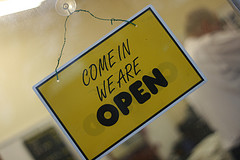This post is going to be a bit of a mashup. Mainly because I haven’t blogged in a while and I want to throw a few crumbs of learning gleaned in the meantime into the mix. See what comes up.
I’ve been thinking about openness quite a lot recently. That’s why before Christmas I participated in Connected Courses #ccourses
Connected Courses is a collaborative network of faculty in higher education developing online, open courses that embody the principles of connected learning and the values of the open web.
and why over Christmas I read Martin Weller‘s book, The Battle for Open – how openness won and why it doesn’t feel like victory.
So with both of these in mind, no wonder I was interested to see Jeff Merrell post his plans to open up his course (on enterprise knowledge sharing or enterprise social networks (ESNs)). Yes, that’s the very same Jeff Merrell of the the open, online seminar Exploring Personal Learning Networks #xplrpln that I participated in back in 2013; and which turned out to be a truly powerful learning event, not just for me but for a number of other participants too (see my post at the time and Helen Blunden’s or Maureen Crawford’s just recently).
‘Popping the lid off‘ a regular college class is an intriguing development. Now that the hype surrounding MOOCs has died down it shows the kind of experimentation (in the original connectivist sense of the phenomenon) that’s possible, a point that Martin Weller makes in his book.
Much of the hype around MOOCs has positioned them as being in competition to formal education. While this adversarial framing may make good sense in terms of a media narrative […] it underplays both the actual impact of MOOCs and the adaptability of education. An alternative perspective is to view MOOCs as being similar to OERs, and complementary to formal education.
Here he cites the example of ‘opening up a portion’ of a course, and goes on to give a whole load of reasons why, and the positives that might be gained.
The aim(s) expressed for Exploring Innovations in Networked Work and Learning is to explore the potential innovation that comes from criss-crossing domain boundaries (my kind of thing!!), that is from business and management practices and from education or organizational learning practitioners, and also to integrate other (out there) enterprise social networking enthusiasts with students enrolled in the face-to-face class.
I welcome this kind of innovation, and anything that helps learners to connect and learn in the open has got to be a good thing. Shall I see you there?
OERs = open educational resources
References:
Weller, M. 2014. Battle for Open: How openness won and why it doesn’t feel like victory. London: Ubiquity Press. DOI: http://dx.doi.org//10.5334/bam

This work is licensed under a Creative Commons Attribution-ShareAlike 4.0 International License.





